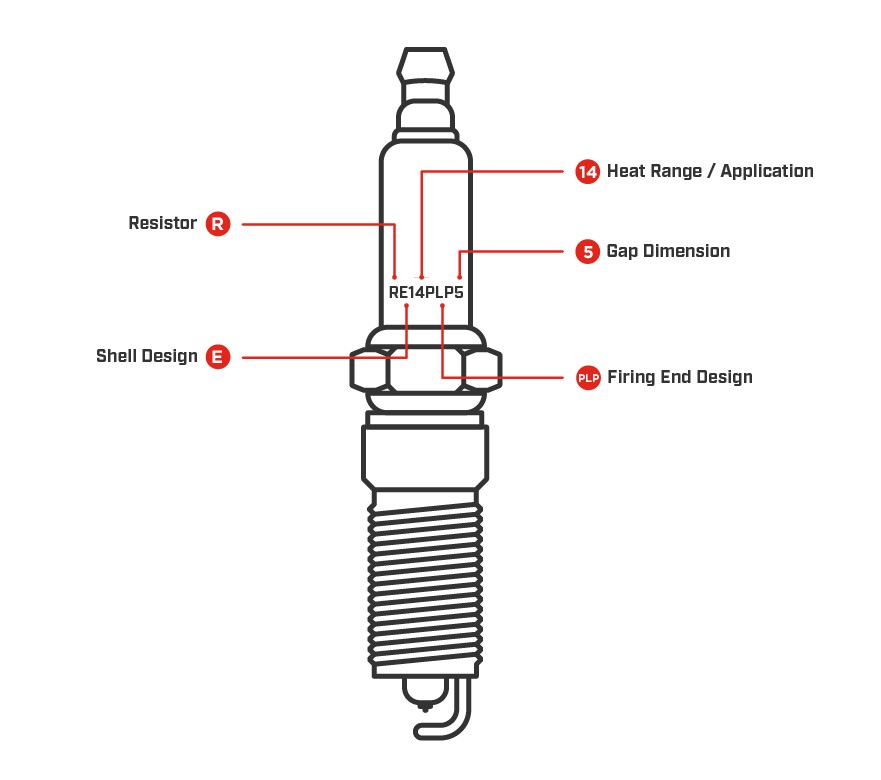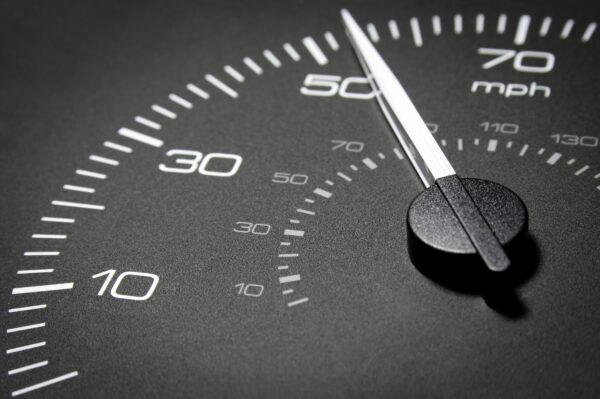
The combination of letters and numbers assigned for every Champion spark plug is a logical formula which indicates the major features of its design.

Let’s take a closer look:
[R] Resistor – If an R is present, this indicates a resistor type spark plug. Resistor type spark plugs reduce the amount of radio frequency interference (RFI) that can cause ignition misfires and static on the radio.
[V] Shell Design – This refers to the thread size and reach of the spark plug.
[15] Heat Range – The middle number indicates the heat range of the spark plug, the higher the number the hotter the heat range.
[YC] Firing End Design – The letters after the heat rating indicates a special spark plug construction feature called the firing end design. The letters refer to the center electrode material, projection dimension and ground material.
[4] Gap Designation – The number after the heat rating indicates the wide gap designation. Please note, the wide gaps are required to meet federal and California requirements.
Find the Design of Your Spark Plug
Time to replace your spark plug? There’s a Champion spark plug for every application:
Resistor
R Resistor 3k ohm/ 10k ohm
K Resistor 1k-2k ohm
T Resistor 7k-15k ohm
Q Low resistance, inductive suppressor
X Combined resistive/inductive suppression
U Internal auxiliary air gap (booster gap)
If the very first character listed in the plug type number is not one of the characters listed above, the plug is a non-resistor type (doesn’t contain a resistor)
Shell Design
THREAD x REACH x SEAT x HEX
A 12mm x 1.25mm, .750″, gasket/joint, 5/8″ or 18mm
C 14mm x 1.25mm, .750″, gasket/joint, 5/8″
CJ 14mm x 1.25mm, .375″, gasket/joint, 3/4″
DJ 14mm x 1.25mm, .307″, taper, 5/8″
E 14mm x 1.25mm, .984″, taper, 5/8″
EA 12mm x 1.25mm, 1.043″, gasket/joint, 14mm
EC 14mm x 1.25mm, 1.043″, gasket/joint, 5/8″
ER 12mm x 1.25mm, 1.043″, gasket/joint, 5/8″
ES 14mm x 1.25mm, .984″, taper, 5/8″
ET 12mm x 1.25mm, 1.043″, taper, 14mm
F 18mm x 1.5mm, .429″, taper, 13/16″
G 10mm x 1.0mm, .750″, gasket/joint, 5/8″
J 14mm x 1.25mm, .375″, gasket/joint, 13/16″
L 14mm x 1.25mm, .500″, gasket/joint, 13/16″
N 14mm x 1.25mm, .750″, gasket/joint, 13/16″
P 12mm x 1.25mm, .500″, gasket/joint, 11/16″
S 14mm x 1.25mm, .689″, taper, 5/8″
V 14mm x 1.25mm, .441″, taper, 5/8″
Y 10mm x 1.0mm, .375″, gasket/joint, 5/8″
Z 10mm x 1.0mm, .500″, gasket/joint, 5/8″
The tabulated values generally hold true for the more common plug types. There may be minor variations from the tabulated values for the less common plug types.
Heat Range / Application
1 to 20 Automotive & small engine
20 to 49 Historical aviation
50 to 65 High performance racing plugs
65 to 100 Industrial & small engine
Please note, within a given plug family the plugs run hotter as the number gets higher. Generally, the Racing and Industrial plug families run colder than the automotive plug family even though they have higher numbers.
Firing End Design – Electrodes and Projection
CENTER ELECTRODE MATERIAL
W Iridium
P Platinum
G Gold palladium
CORE NOSE PROJECTION
RETRACTED No Projection
H .020″-.030″
Y .060″-.090″
M .100″-.140″
L .180″-.220″
E .240″-.300″
GROUND ELECGTRODE MATERIAL
C Copper
CC Double copper
P Platinum
G Gold palladium
Wide Gap Designation
2 .020“
3 .030″
4 .040″
5 .050″
Special Design Features*
Z Skirted plug
LM Lawn mower plug
V Surface gap
B Fine wire rivet design
On a skirted shell, the threads on the metal shell stop before they reach the bottom. Non-skirted plugs have threads all the way to the bottom of the shell.
*Some plugs have special design features. If the first character after the heat range (number) is not one of the center electrode references, check the Special Features matrix.
Learn more about quality spark plugs, find your car part, or find where to buy your auto part today.
The content contained in this article is for entertainment and informational purposes only and should not be used in lieu of seeking professional advice from a certified technician or mechanic. We encourage you to consult with a certified technician or mechanic if you have specific questions or concerns relating to any of the topics covered herein. Under no circumstances will we be liable for any loss or damage caused by your reliance on any content.
Disclaimer: The content published on this site is mainly original, reprinted, and shared online content. If there is any infringement, please contact email: [email protected], and we will delete it as soon as possible. The opinions of the article do not represent the position of this site, please contact us if you need to deal with it.



